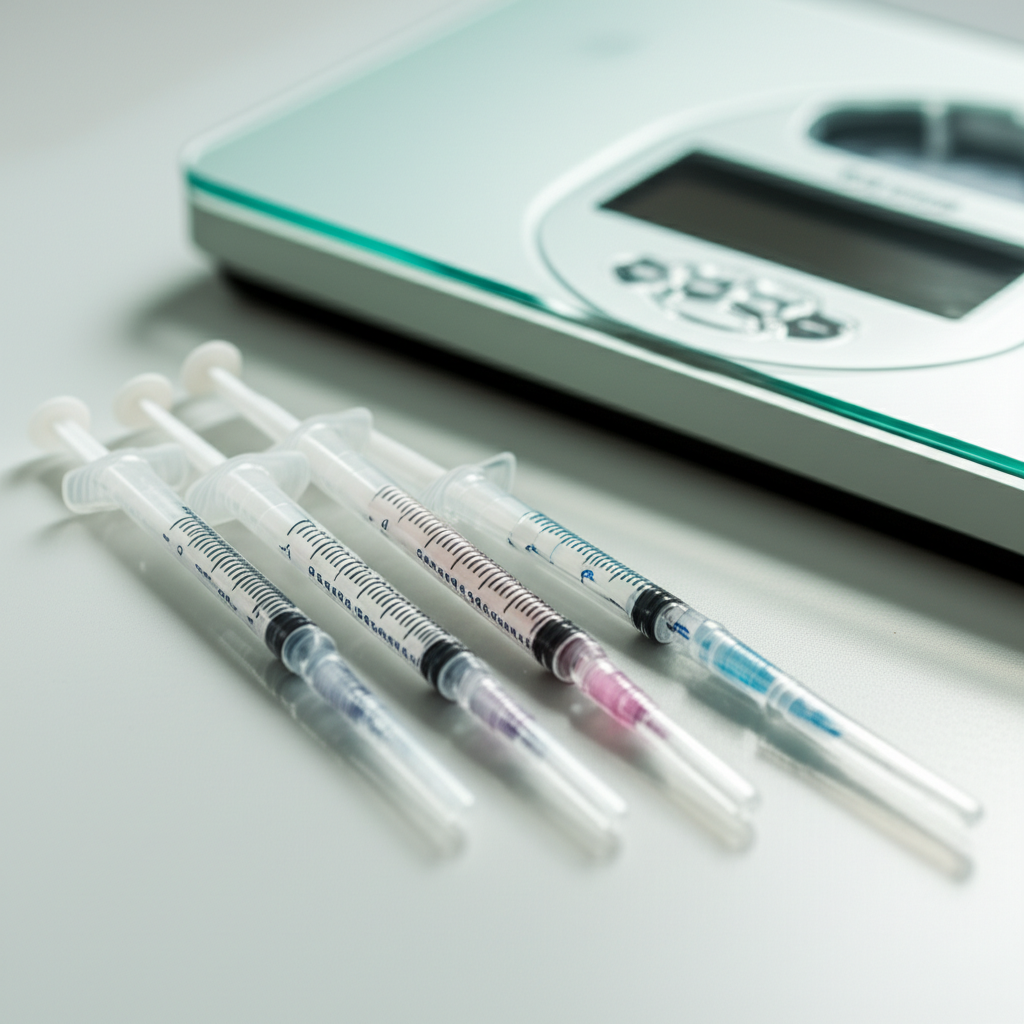Essential Truths: What Happens When You Stop Weight Loss Injections?
Bolded Summary: Stopping weight loss injections typically leads to rebound weight gain if lifestyle changes aren’t maintained. Expect a gradual return of appetite and potential weight regain, varying by individual. Sustainable habits are key to long-term success after discontinuing medication.
Do you ever look in the mirror and wish the extra pounds would just vanish? You’ve tried dieting, working out, and skipping meals—but nothing seems to stick long-term? It’s a feeling many of us share. For some, weight loss injections have offered a ray of hope, a tool to kickstart their journey. But what happens when the injections stop? It’s a question that often lingers, carrying both hopes and anxieties. You’re not alone in wondering if the progress you’ve made will disappear as quickly as it arrived. This guide will walk you through the essential truths, helping you prepare and navigate this next phase with confidence.
Understanding Weight Loss Injections

Before we dive into what happens when you stop, let’s briefly touch upon what these injections are and how they work. Medications like semaglutide (often known by brand names like Ozempic or Wegovy) and liraglutide work by mimicking a hormone called GLP-1. This hormone plays a crucial role in regulating appetite, slowing down how quickly your stomach empties its contents, and signalling to your brain that you’re full. For many, this translates to feeling less hungry, eating smaller portions, and consequently, losing weight.
It’s important to remember that these injections are typically prescribed as part of a comprehensive weight management program, which includes dietary changes and increased physical activity. They are not a magic bullet but a tool to assist in achieving a healthier weight. Think of them as a helpful guide, pointing you in the right direction, but you still need to walk the path.
The Transition Away From Injections: What to Expect
As you approach the end of your injection therapy, or if you decide to discontinue it for any reason, it’s natural to feel a mix of emotions. You might be proud of your achievements, but also apprehensive about maintaining them. The key takeaway is that the effects of the injections on your appetite and metabolism will gradually diminish. This means:
Gradual Return of Appetite
One of the first things you might notice is that your appetite starts to increase. The sensation of fullness may not last as long, and you might find yourself thinking about food more frequently. This is your body readjusting to its pre-injection state, and it’s a completely normal physiological response. Instead of viewing this as a setback, see it as an opportunity to practice the healthy eating habits you’ve cultivated.
Potential for Weight Regain
Without the ongoing influence of the medication to suppress appetite, there is a potential for weight regain. How much and how quickly depends heavily on your individual metabolism, genetics, and, most importantly, your lifestyle choices post-injection. This is precisely why your healthcare provider likely emphasized making sustainable lifestyle changes alongside the injections.
Real-life Example: Consider Maria, who used weight loss injections for 18 months and successfully lost 40 pounds. She loved feeling less controlled by her cravings. When she stopped the injections, she noticed her hunger creeping back within a few weeks. Initially, she felt discouraged, but she remembered her doctor’s advice. Instead of panicking, she doubled down on her meal prepping and focused on mindful eating. While she gained a few pounds back, she managed to stabilize her weight by staying consistent with her exercise routine and healthy diet.
Slowing Metabolism (Consideration)
While the injections themselves don’t permanently slow your metabolism, rapid weight loss, especially without sufficient muscle mass maintenance, can sometimes lead to a slight decrease in resting metabolic rate. This means your body might burn slightly fewer calories at rest. Focusing on building and maintaining muscle mass through strength training becomes even more critical during and after injection therapy to counteract this.
Practical Strategies for Maintaining Your Progress
Now for the actionable part! Stopping weight loss injections doesn’t have to mean a free-for-all. Here are proven strategies to help you maintain your hard-earned results and continue on your health journey:
1. Embrace Sustainable Eating Habits
This is the cornerstone of long-term success. Instead of restrictive diets, focus on nourishing your body with whole, unprocessed foods.
- Prioritize Protein: Protein helps you feel fuller for longer and is essential for muscle maintenance. Include sources like lean meats, fish, eggs, beans, lentils, and tofu in every meal.
- Fill Up on Fiber: Fruits, vegetables, and whole grains are packed with fiber, which aids digestion and promotes satiety. Aim for a variety of colors on your plate.
- Mindful Eating: Pay attention to your body’s hunger and fullness cues. Eat slowly, savor your food, and avoid distractions like TV or your phone during meals.
- Hydration is Key: Sometimes, thirst can be mistaken for hunger. Drink plenty of water throughout the day.
Visual Suggestion: A colorful infographic displaying high-protein, high-fiber foods would be beneficial here.
2. Make Physical Activity a Non-Negotiable
Exercise helps manage weight, improves overall health, and boosts mood. Find activities you genuinely enjoy.
- Cardiovascular Exercise: Aim for at least 150 minutes of moderate-intensity aerobic activity per week (e.g., brisk walking, cycling, swimming).
- Strength Training: Incorporate strength training at least two days a week. This is crucial for building and maintaining muscle mass, which boosts your metabolism. You can use weights, resistance bands, or even your body weight.
- Increase NEAT (Non-Exercise Activity Thermogenesis): Small movements throughout the day add up. Take the stairs, park further away, walk during phone calls, or do some stretching breaks.
Visual Suggestion: A table outlining a sample weekly workout schedule would fit perfectly here.
| Day | Morning (Optional) | Afternoon/Evening |
|---|---|---|
| Monday | 15 min stretch | 30 min brisk walk |
| Tuesday | 30 min strength training (upper body) | |
| Wednesday | 15 min yoga | 45 min cycling |
| Thursday | 30 min strength training (lower body & core) | |
| Friday | 15 min walk | 30 min dance class or Zumba |
| Saturday | 60 min hike or longer recreational activity | |
| Sunday | 30 min active recovery (gentle walk, stretching) | Rest |
3. Monitor Your Progress (Wisely)
Regularly checking in with yourself can help you stay on track without becoming obsessive.
- Weigh Yourself Weekly: Pick the same day and time to weigh yourself. Don’t get discouraged by small fluctuations.
- Focus on How You Feel: Pay attention to your energy levels, sleep quality, and how your clothes fit. These are often more significant indicators of progress than the number on the scale.
- Journaling: Consider keeping a journal to track your food intake, exercise, mood, and any challenges you face. This can provide valuable insights.
4. Seek Support and Accountability
You don’t have to do this alone. Sharing your journey can make it more manageable and enjoyable.
- Talk to Your Doctor: Your healthcare provider is your best resource. They can offer personalized advice and monitor your health.
- Connect with Friends or Family: Share your goals with supportive loved ones who can cheer you on.
- Join a Support Group: Online or in-person groups can provide a community of people with similar experiences.
External Link: The National Institute of Diabetes and Digestive and Kidney Diseases (NIDDK) offers excellent resources on maintaining a healthy weight after weight loss.
5. Manage Stress and Prioritize Sleep
These often-overlooked factors can significantly impact your weight management efforts.
- Stress Management Techniques: Practice deep breathing, meditation, yoga, or spend time in nature to manage stress. Chronic stress can lead to increased cortisol levels, which can promote belly fat storage and increase appetite.
- Prioritize Sleep: Aim for 7-9 hours of quality sleep per night. Poor sleep can disrupt hormones that regulate appetite, leading to increased hunger and cravings for unhealthy foods.
Common Concerns and Myths Debunked
Let’s address some of the anxieties and misconceptions people have about stopping weight loss injections.
Myth: You’ll instantly gain all the weight back.
Truth: While rebound weight gain is a possibility, it’s not an automatic or immediate event for everyone. If you implement healthy habits consistently, you can minimize or even avoid significant weight regain. Your body is adapting, and this is a transition period.
Myth: The injections made your metabolism run slower permanently.
Truth: The medications don’t fundamentally alter your long-term metabolic rate. Any perceived slowing is usually related to the natural decrease in metabolism that can occur with significant weight loss (especially if muscle mass declines), not a permanent side effect of the drug itself.
Myth: You have to go back on the injections to maintain weight loss.
Truth: The goal of these medications is to be a tool, not a lifelong dependency. Many individuals successfully maintain their weight loss by focusing on sustainable lifestyle changes, especially if they establish strong habits during their treatment period.
Building a Long-Term Lifestyle for Success
Think of the time you spent on weight loss injections as a powerful launching pad. The journey doesn’t end when the medication does; it evolves. The skills and knowledge you’ve gained about nutrition, exercise, and mindful eating are now your tools.
Sarah, who we mentioned earlier, found that consistency was her biggest ally. After stopping her injections, she experienced fluctuations in her appetite. Instead of giving in to every craving, she learned to moderate her portions and choose nutrient-dense snacks. She also committed to her morning walks, finding they not only helped her physical health but also cleared her mind and set a positive tone for the day. Within six months of stopping, she had maintained 90% of her weight loss, feeling empowered by her own discipline.
The true “essential truth” about stopping weight loss injections is that ongoing commitment to a healthy lifestyle is paramount. It’s about creating a way of living that supports your well-being, not a temporary fix.
Frequently Asked Questions About Stopping Weight Loss Injections
How long does it take to stop feeling the effects of weight loss injections?
The effects typically start to diminish gradually over a few weeks to a couple of months after your last dose, depending on the specific medication and your individual metabolism.
Can I still lose weight after stopping the injections?
Absolutely! While the injections may have helped initially, continued focus on a healthy diet, regular exercise, and lifestyle changes can still lead to further weight loss or maintenance.
What if I start gaining weight back?
This is a sign to reassess your current eating and activity habits. Review portion sizes, nutrient intake, and your exercise routine. Consult with your doctor or a registered dietitian for personalized guidance.
Should I talk to my doctor before stopping?
Yes, it’s highly recommended. Your doctor can help you create a plan for safely discontinuing the medication and provide strategies for maintaining your progress.
How can I manage increased hunger after stopping?
Focus on filling up with high-fiber foods, lean protein, and staying well-hydrated. Practicing mindful eating and identifying emotional triggers for hunger can also be very effective.
Will my body ever feel normal again?
Yes, your body will adjust. The feelings of reduced appetite were due to the medication’s influence. By adopting healthy habits, you’ll help your body find a stable, healthier equilibrium.
Conclusion: Your Empowered Path Forward
Stopping weight loss injections is a significant step on your overall health journey. While it’s natural to feel uncertain, remember that the progress you’ve made is real and attainable long-term. The essential truth is that sustained success hinges on adopting and maintaining healthy lifestyle habits. Your body has responded to the support of the injections, and now it’s time to show it love and care through consistent nutrition, regular movement, adequate sleep, and stress management.
Don’t view this transition as an endpoint, but as a new beginning. It’s an opportunity to solidify the empowering habits you’ve learned and to trust your own resilience. Your weight loss journey doesn’t have to be complicated. Start small, stay consistent, and remember—even the smallest steps lead to big results. You’ve got this!



